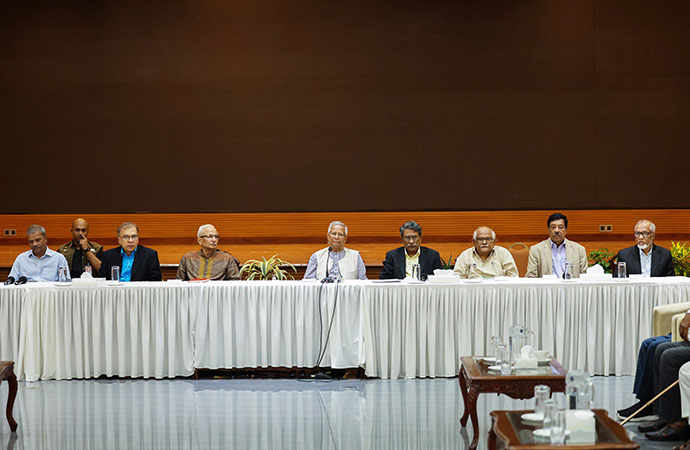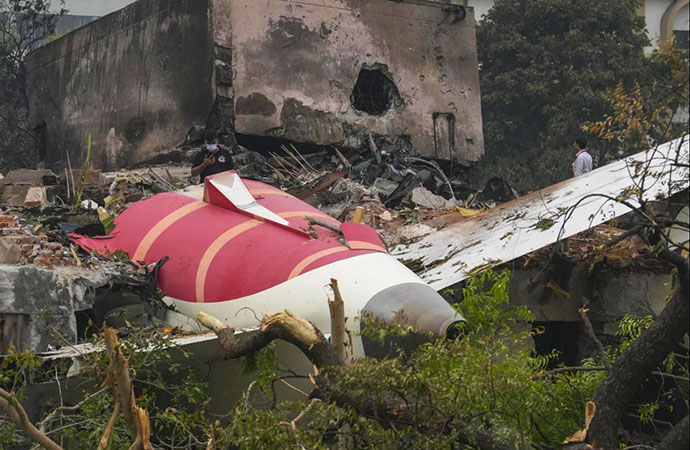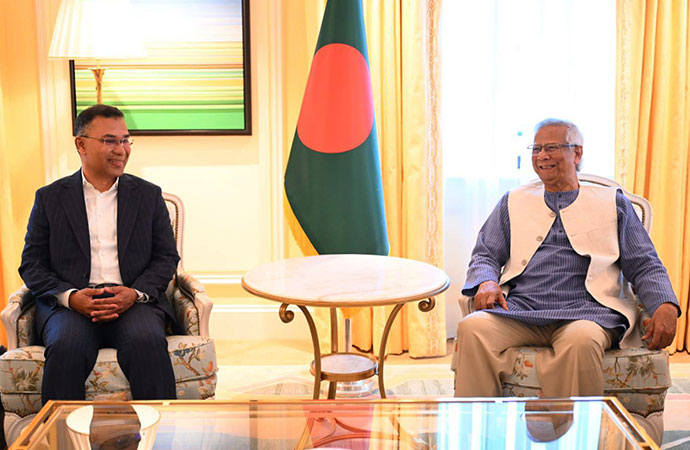Reportage

Image: Collected
Reform, justice, and election - the three faces of the mandate on which the interim government has staked its legitimacy. Many mistook it for the kind of caretaker government that was installed following the overthrow of the Ershad regime in 1990. While the three-month caretaker model may have been right for the time then, no one should have harboured illusions that the government installed on August 8, 2024, three days after the collapse of the Awami League regime led by Sheikh Hasina, would follow that model. No one even raised the idea.
While the aspiration of 2024, broadly stated, may have been rooted in the same democratic values that informed the movement's culmination in 1990 (and indeed, at its heart in 1971 as well), the context made the two historic junctures as far apart as possible. While the joy of overthrowing an authoritarian regime may have been shared, victory in 2024 was accompanied by the trauma of a generation that had stared down the barrel of the state security agencies' guns.
The UN-estimated 1400 lives that were lost placed a heavy burden on the leaders of the Uprising. As they seek to build a better Bangladesh from the ashes of what the League's misrule left behind, they must constantly acknowledge their debt to their comrades, whose blood paid for a day they would never get to see. For better or for worse.
Our debt to the martyrs of '24 made justice a pillar of the Uprising. Indeed, the 9-point demand that emerged on the night of July 19, after the state started firing on the crowds from July 16, had accountability for those deaths as the most important demands. Not only did nothing suggest the government would meet them even halfway on those demands, from all that we witnessed over the following fortnight - the crackdown never eased, it kept getting worse. But what made the students the biggest stakeholders in a movement that now rapidly drew in varied sections of society, was that they never stood down till the end. They saw it through, they outlasted the regime and its bullets and realised, for the first time in their lives, their own strength.
The movement in 1990 we know, was led by the political parties, coming together under three different banners. Some commentators and politicians have tried to suggest students were at the forefront in 1990 as well, and yet they went back to their books once the movement's aims were met. It rings somewhat true, till we are reminded that most of the students back then participated as members of Chhatra League or Chhatra Dal or the leftist students' alliance.
The 'Chhatra Samaj' of 2024 was a much wider alliance among the students, and their dream for a 'New Bangladesh' entailed a wide-ranging reform effort. The chief adviser himself is leading the work of a Consensus Commission that has been tasked with realising a consensus among the political parties on the most important reforms to implement, that reflect the eternal values of the people of this land. The six separate commissions that led to this stage have done their jobs well, suggesting essential changes that, once implemented, can potentially change the face of Bangladesh's democracy.
That brings us to the third pillar - deliver a free and fair election. In the last few weeks to a month, we have seen the political unity that defined the coalition of July '24 melt away over this question only. The BNP endured persecution throughout the period that AL ruled, and can be said to enjoy the largest stake in the election, since they are expected to win it handily in the absence of the Awami League (whose activities remain banned till the trial process of its leaders, and perhaps the party itself, is completed at the International Crimes Tribunal.) Notably, it no longer speaks of forming a 'National' government drawn from the 'Anti-Fascist' coalition.
The party's old partner, Jamaat e Islami, no longer seems satisfied to play the role of a junior partner. It appears unable to influence the newly formed National Citizen Party, or NCP, which aims to represent the students and seeks to uphold the ideals of 'July'. Serious differences opened up between these various factions over the date for holding the election, and after being stung on a few occasions regarding some less important matters (such as Ishraque Hossain's wholly undemocratic desire to be sworn in as mayor of Dhaka South), the BNP put its foot down, demanding elections at the short end of the 'December to June' range that Chief Adviser Muhammad Yunus and his advisers have been parrotting for months. Almost every BNP leader of note has cried themselves hoarse in the last one month demanding a December election.
What can possibly be gained by six months this way or that, they fail to explain. Mostly, they seem driven by a sudden belief that Yunus cannot be trusted; that he is plotting to perpetuate his spell as head of government; that his ambitions run deeper. If it feels like you've heard all of that somewhere before, that's because you have: the fallen leaders of AL, not least the ex-prime minister, have been repeating these ad nauseam, mostly during their appearances on Indian media, for the last 10 months. Relentlessly.
That alone should have been enough to tell the BNP not to go down this route, but for some reason they now feel emboldened to flaunt their size, their heft, and throw their weight around, in pursuance of the otherwise legitimate demand for an election. To be clear, the BNP can never be faulted for demanding elections. Any political party that wants to go to the people for its decision is to be commended. But for the sake of the "anti-Fascist coalition" that encompassed the forces of July, the date for this election should be arrived at through consensus, not through unreasonable demands and threats of movements. That weakens the hand of the revolutionaries. And anything that weakens the revolutionaries, can only strengthen the fallen order.
Besides, if trusting Dr Yunus was such an issue, why did the BNP not raise its objections prior to August 8? It had enough influence at that stage, to at least force a rethink on the part of the students, having participated in their movement widely across the nation, although not under their party's banner, for strategic reasons. That strategic pooling of resources did not survive the Uprising.
A date is not enough?
Under growing pressure, the chief adviser finally budged, and on the eve of Eid ul Azha, announced that the country will hold national elections in the first half of April 2026. In a televised address to the nation that covered much ground, the Nobel Peace Prize laureate added that the Election Commission would roll out a detailed roadmap for the election in due course.
The BNP had been lately demanding the elections be held in December. But their senior leaders are also on record promising that all they want is a definitive date, which could be anywhere in the six-month margin Yunus was working with.
Salahuddin Ahmed, who is emerging as a leading spokesman for the party since returning from India after 9 years following his illegal rendition under the AL regime, criticised Yunus for failing to "to meet the expectation of the nation" about the polls schedule.
In an immediate reaction to the media, he said that April is not ideal for an election because the annual month of fasting that starts in mid-February makes campaigning challenging. He said it would also be difficult for a new government to formulate the year's budget, usually announced in June.
Then, following an emergency virtual meeting of the party's highest policy-making body, a statement was issued in the early hours of Eid day. It said the Standing Committee meeting, presided over by BNP acting chairman Tarique Rahman, was convened following Chief Adviser Professor Muhammad Yunus' televised address to the nation.
The statement said the meeting extensively reviewed the contents of the CA's speech and concluded that the announcement ignored the aspirations of a nation striving to reclaim its right to vote through prolonged struggles.
"The people of this country, deprived of their basic voting rights for almost a decade and a half, have continued their struggle to restore democracy through voting, despite being disappeared, murdered, imprisoned, injured, and tortured," the BNP policymakers said.
They said although the non-partisan interim government speaks of building consensus, it has put its own neutrality into question by becoming influenced by a particular political quarter. "So, the meeting believes that the people of the country may be rightly concerned about the possibility of a free and fair election (under this government)."
The BNP Standing Committee observed that holding the election in early April could lead to complications-both due to adverse weather conditions and the challenges of conducting campaigns and election-related activities during Ramadan-which may ultimately be used as grounds for deferring the polls.
Besides, they said the address did not provide any clear justification as to why holding the election by December would not be feasible. The meeting unanimously observed that the CA's statement, initially intended as a message marking Eid-ul-Azha, instead turned into an address to the nation - so they were even criticising him for giving a date now, despite moving heaven and earth for it in the preceding two weeks.
The BNP policymakers said in his lengthy speech, Dr Yunus touched upon issues such as ports and corridors-topics which, by his own admission, do not fall within the three mandates of the interim government. "The meeting expressed anger at his choice of words in the speech, which crossed the limits of political decorum."
It added that the chief adviser's announcement to hold the next national election in early April 2026 has "disappointed and angered people", reiterating its demand for the polls to be held by December this year.
"People's victory was achieved through the immense sacrifices made by students and the mass people during the July-August 2024 movement. But the unwarranted delay in arranging the election has disappointed and angered the people," the party said in the statement, before concluding on the following note:
"So, the (BNP's) National Standing Committee meeting reiterates its proposal to hold the election by December this year, taking into consideration Ramadan, secondary and higher secondary or equivalent examinations, and weather conditions, etc."
The preceding week had seen tens of thousands of students and youths who support BNP rally in the capital, calling for a general election in December, signaling discontent with the interim government.
Activists from three groups linked to the BNP, headed by former Prime Minister Khaleda Zia gathered on the streets outside its party headquarters, under heightened security.
The rally was held after weeks of political tensions after interim leader Yunus even threatened to quit and the influential military chief publicly declared his support for an election in December.
Khaleda Zia, who has been suffering from ill-health for several years, recently returned to Bangladesh after four months of medical treatment in London, putting further pressure on Bangladesh's interim government to call an election.
Tarique Rahman addressed the rally by video link from London, where he is in exile. Detailing his party's future plans for youth and others, Rahman reiterated his call for the next elections to be held in December and asked his supporters to prepare.
"The polls must be held by December. It has to take place within December," he said.
Jamaat's hand getting better
In a separate development, Bangladesh's Supreme Court earlier this month cleared the path for the Jamaat-e-Islami to regain its registration as a political party after a decade - a decision that would enable the party to take part in elections.
The country's top court overturned a previous High Court verdict and said it is now up to the Election Commission to formally restore the registration of Bangladesh's largest Islamist party and their election symbol.
A special tribunal set up to try Bangladesh's ousted Prime Minister Sheikh Hasina began proceedings Sunday by accepting charges of crimes against humanity filed against her in connection with a mass uprising in which hundreds of students were killed last year.
The Dhaka-based International Crimes Tribunal directed investigators to produce Hasina, a former home minister and a former police chief before the court on June 16.
Hasina has been in exile in India, while former Home Minister Asaduzzaman Khan is missing and possibly also in India. Former police chief Chowdhury Abdullah Al Mamun has been arrested. Bangladesh sent a formal request to India to extradite Hasina in December. State-run Bangladesh Television broadcast the court proceedings live.
Hasina and her Awami League party had earlier criticised the tribunal and its prosecution team for their connection with political parties, especially with Jamaat. The chief prosecutor appointed after the August 5 changeover was the chief counsel at one stage, for the Jamaat leaders who were prosecuted at the same tribunal for crimes against humanity committed during the War of Liberation in 1971.
In an investigation report submitted on May 12, the tribunal's investigators brought five allegations of crimes against humanity against Hasina and the two others during the mass uprising in July-August last year. According to the charges, Hasina was directly responsible for ordering all state forces, her Awami League party and its associates to carry out actions that led to mass killings, injuries, targeted violence against women and children, the incineration of bodies and denial of medical treatment to the wounded.
The charges describe Hasina as the "mastermind, conductor, and superior commander" of the atrocities. The Yunus-led administration, which has already banned the Awami League party, amended relevant laws to allow for the trial of the former ruling party for its role during the uprising.
A meeting at the Dorchester
Amid all this, it was announced that the CA would meet the BNP's acting chairman during his trip to London, originally to pick up an award from King Charles III and hold meetings with senior British officials, mainly with a focus on recovery of assets siphoned out of Bangladesh. The UK has so far frozen over a quarter of a billion pounds in assets belonging to AL regime beneficiaries. That's around $350 million.
But the meeting with Tarique, scheduled for the last day of his stay (Friday, June 13), by-and-large overshadowed everything else that transpired during this trip, including a pointed snub by UK prime minister Keir Starmer, who declined to grant the CA a meeting, despite his government's very close cooperation with the IG in Bangladesh. BNP and other political parties hoped the Yunus-Tarique talks would help resolve the ongoing political crisis surrounding the election and other key national issues.
Although Chief Adviser's Press Secretary Shafiqul Alam said the agenda would be set by the two leaders themselves, BNP senior leaders and political analysts believed several core issues were likely to be raised.
These include the election timeline, reforms, the July Charter, justice for the victims of the July-August mass uprising, a safe and orderly transition of power, ratification of decisions made by the interim government, a dignified exit strategy for the interim administration, and the potential return of Tarique Rahman to Bangladesh.
The meeting comes in the wake of Professor Yunus' recent national address, where he announced that the 13th general election would be held in the first half of April next year. The BNP, which has persistently demanded the election be held by December this year, reacted with disappointment, terming the decision unilateral and unrealistic.
BNP leaders viewed this meeting as a significant step towards resolving the impasse over the election schedule, suggesting that adjusting the timeline would be a central issue in the talks. In the end, the joint statement reflected a positive meeting that should serve to reassure all Bangladeshis:
Today, BNP Acting Chairman Mr. Tarique Rahman met with the visiting Chief Advisor Professor Dr. Muhammad Yunus in London. Their meeting was held in a very cordial atmosphere.
Mr. Tarique Rahman proposed to the Chief Advisor to organize the elections before Ramadan next year. Party Chairperson Begum Khaleda Zia also thinks that it would be better if the elections were held at that time.
The Chief Advisor said that he has announced to hold the elections by the first half of April next year. If all preparations are completed, the elections can be organized in the week before the start of Ramadan in 2026. In that case, it will be necessary to achieve sufficient progress on reforms and justice by that time.
Mr. Tarique Rahman welcomed this position of the Chief Advisor and thanked him on behalf of the party. The Chief Advisor also thanked Mr. Tarique Rahman for the fruitful discussions.
(Chief Adviser's Press Wing)

























Leave a Comment
Recent Posts
Right On Schedule
The most eagerly anticipated, and frankly hyped up, announcement of an ...
Fighting raged along the borde ...
Fighting raged along the border of Cambodia and Thailand, with explosi ...
ICIMOD drives regional cooperation to inspire new mo ..
The Cage of Captivity and the Cry for Freedom: A Cru ..
Why Japan issued an advisory for a possible megaquak ..
The Autocrats’ War on Universities